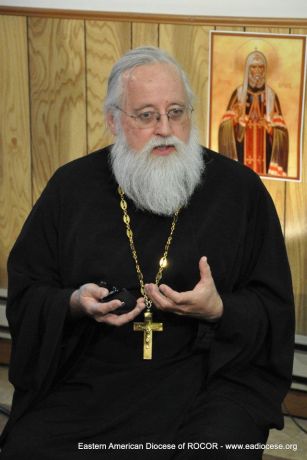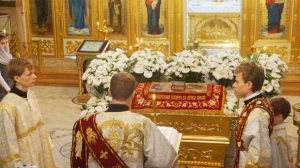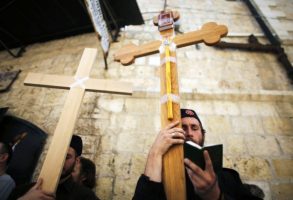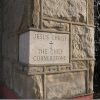Archpriest John Moses is Rector of All Saints of North America Russian Orthodox Church in Middlebrook, VA, and assists at a new mission, Holy Myrrhbearers Orthodox Christian Church, in Harrisonburg, VA.
 Sophia Moshura: If we feel that we have not spent Great Lent properly, how can we still use the remaining days of Holy Week to prepare worthily for Pascha?
Sophia Moshura: If we feel that we have not spent Great Lent properly, how can we still use the remaining days of Holy Week to prepare worthily for Pascha?
Fr. John Moses: The days of Holy Week are designed to represent to us the last week of Christ’s earthly life before His Crucifixion. It is a terrible and wonderful journey: terrible because the Lord will have to endure so much; and wonderful because if we take this journey with Him, it can be a life-changing experience. If we do a bit of study and reading before we go to church, each service will be even more powerful and meaningful.
Given that work and family obligations prevent many people from attending all the services of Holy Week, which services should one make a particular effort to attend?
We celebrate Unction on Wednesday night of Holy Week. This wonderful service brings healing to body, soul, and spirit. I wouldn’t miss it. Then, many who have trouble making other services seem to find the time to come to the service of the Burial Shroud on Holy Friday. There is something quite moving about this service, as we process with the shroud and lay it on the “tomb” in the middle of the church. Finally, I truly love the service of Lamentations on Friday night. The imagery of the language always surprises and inspires me, as we lament the death of our Lord in semi-darkness.
I know that some might find this to be a revolutionary idea, but I think all Orthodox people should be at every service on Holy Friday. This might mean taking a day off from work (gasp!). The Crucifixion of our Lord and His Resurrection go together, and we shouldn’t separate them.
As we consider Christ’s betrayal during His earthly life, how can we avoid betraying Him in our hearts and minds as we maneuver our way through daily life in the contemporary world?
Truly, we are all Judas and we are all Peter. One of the difficult sayings of the Lord is that we should be in the world, but not of the world (cf. John 17: 13-16). This is a very difficult thing to do. The struggle of life raises the question of how we can avoid compromise when we work with people, relate to neighbors, and live in a world that is often so anti-Christian. St. Paul makes this issue very personal and intimate. He tells us that at every moment we face a choice. We can follow the lead of our flesh or we can follow the lead of the Spirit. This why even St. Paul said that he had to die daily (1 Corinthians 15:31). At each moment of life, we can follow the Lord or betray Him. We are all Judas. Thankfully, Holy Week teaches us that even betrayal is forgiven, even a betrayal that has been done multiple times. We are all Peter. So what we must not do is give in to despair. The devil would tell us that our betrayal is too deep, or has been repeated too often, to hope for God’s love and forgiveness. This is a great lie and, when we hear it in our souls, we should remind the devil of the Prodigal Son and of the forgiveness of St. Peter. I would also say that a life of faithfulness is very possible, but it is a matter of love. The Lord said, if ye love Me, keep My commandments (John 14:15). So, my betrayals demonstrate the shallowness of my love for Jesus.
What lessons can those who already lead a conventionally pious Orthodox life – e.g., who go to church, keep the fasts, read their prayers, etc. – learn from the example of the life of St. Mary of Egypt?
I love the Orthodox Faith because it always keeps us in balance. St. Zosimas believed that his piety was complete. As he said, no monk anywhere had anything to teach him. Then he met St. Mary and realized that he had hardly started his spiritual journey. We know that fasting, a discipline of prayer, regular church attendance, Confession, and the Eucharist are vital to a strong spiritual life. Yet, here is St. Mary who for forty-seven years had little of that. What she did have was a life of repentance. This teaches us that the goal and purpose of our piety is repentance. We often forget this; our piety can become that of the Pharisees. If I fast to repent, then it is a good fast. If I pray to repent, then it is a good prayer. St. Mary would not have us abandon our disciplines, but she reminds us of the purpose and goal of all piety.
She also shows us what Jesus said to the Pharisee as the woman washed His feet with her tears: Her sins, which are many, are forgiven; for she loved much: but to whom little is forgiven, the same loveth little (Luke 7:47). If we want to be more loving, repentance is the way to achieve it.
Should one expect to have an emotional reaction to the services of Holy Week? If one does not have an emotional experience, does this mean that one has somehow not participated in the services properly?
No, we are to be apathetic! Realizing that this word can be misused or misunderstood, let me explain. The emotions are gifts from God, and the Fathers teach us much about the gift of tears. Yet, because of sin, our emotions are disordered and often serve our spiritual enemies, who use them to confuse and tempt us. Therefore, we should not read meaning into what we are feeling. I may be happy at a service or sad at a service – but, spiritually, what does this mean? The meaning of these emotions is ambiguous. Of course, I love to feel happy, but I know this emotion will pass as quickly as it came. Since we are to be transformed into the image of Christ, we seek a passionless passion. This is the true meaning of apathy – passionless passion – not the absence of emotion, but its proper use and function.
How can one experience and contemplate the events of Holy Week outside of church, such as when one is at work, at school, or caring for one’s family at home?
An awareness of the theme of each day is very helpful. Wherever we are, we can read about and ponder the events of each day of Holy Week. On Holy Friday, an awareness of each hour and what was transpiring for the Lord on this day would be very helpful. If possible, one could say a short prayer at the third, sixth, and ninth hours. We are supposed to fast totally on Holy Friday (which would be possible if we took the day off from work), but if work or other obligations make this impossible, then honor the fast by eating less, skipping a meal, avoiding meat and dairy, or eating more simply. If you have children, take the time to read the Scriptures appointed for each day, explaining to them what the day is about. The point is to avoid the temptation of “all or nothing.” It is truly the devil that suggests to us: if we can’t make all the services, then why go to any? Or, if we can’t keep all the disciplines of Holy Week, then why keep any of them? This robs us of experiencing the full joy of Pascha. Let’s remember that wonderful sermon of St. John Chrysostom at Pascha. Even if we come at the last hour, let us come with joy.
In many monasteries nearly the entire four Gospels are read in church during Holy Week, in addition to the many other Scriptural readings assigned during the services. What particular parts of Scripture can a layperson be advised to read in his or her limited time during Holy Week?
Above all, read the story of our Lord’s Passion: His betrayal, death, and Resurrection. Take time to consider what you are reading, because this week is the moment in time around which the entire universe turns. Read the accounts in all four Gospels if possible. This may mean turning off the television or the radio or getting off Facebook for a while.



















